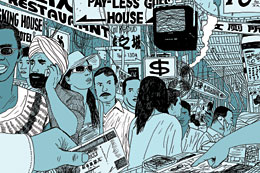
When Hong Kong refers to itself as "Asia's World City" it means the well-ordered worldliness of big banks, fine hotels and a philharmonic. The local tourism board would probably prefer that you didn't think of the worldliness of Nepalese sex workers, Bangladeshi hash dealers and Nigerian men trading used PCs by the container load. But this other Hong Kong can be found across Victoria Harbour, just a few minutes from the city's administrative and financial heart. And the truth is, Hong Kong's claim to internationalism is as equally proven by the demographics of Tsimshatsui, as the tip of the Kowloon peninsula is called, as it is by anything else. The district's pavements are swirling rivers of turbans and baseball caps, hoodies and hijabs.
There is no place in Asia quite so multicultural as Tsimshatsui—not Roppongi, not Xintiandi, not even Khao San Road. And from the center of the area's polyglot hordes rises the great sleepless citadel known as Chungking Mansions. Its five 17-story towers are home to a fixed population of around 5,000. But the housing and commercial complex is visited daily by an estimated 10,000 who trade in everything from secondhand mobile phones to old clothing. Many come from Kolkata (formerly Calcutta) and Dhaka, and a good proportion have overstayed their visas in order to make quick money as restaurant workers or peddlers of counterfeit watches and bags. Gordon Mathews, professor of anthropology at the Chinese University of Hong Kong, has been conducting field research in this high-rise souk for almost a year, living for up to three nights a week in one of its hostels. Mathews says he has informally counted 120 different nationalities by examining guesthouse logs.
For first timers, Chungking Mansions—with its baying touts and shabby surrounds—is a nervy experience. But there is nothing to be afraid of. The haggling and the hustling is simply humanity being itself. A "center for low-end globalization," is how Mathews described it in a recent lecture—a sprawling mart of trade, with no barriers to entry and bargains for all. "My guess would be that 20% of the mobile phones now in use in sub-Saharan Africa have passed through Chungking Mansions," he says. "The ongoing myth has been of Chungking Mansions as a hellhole. But it is not. It is a beacon."
—by Liam Fitzpatrick